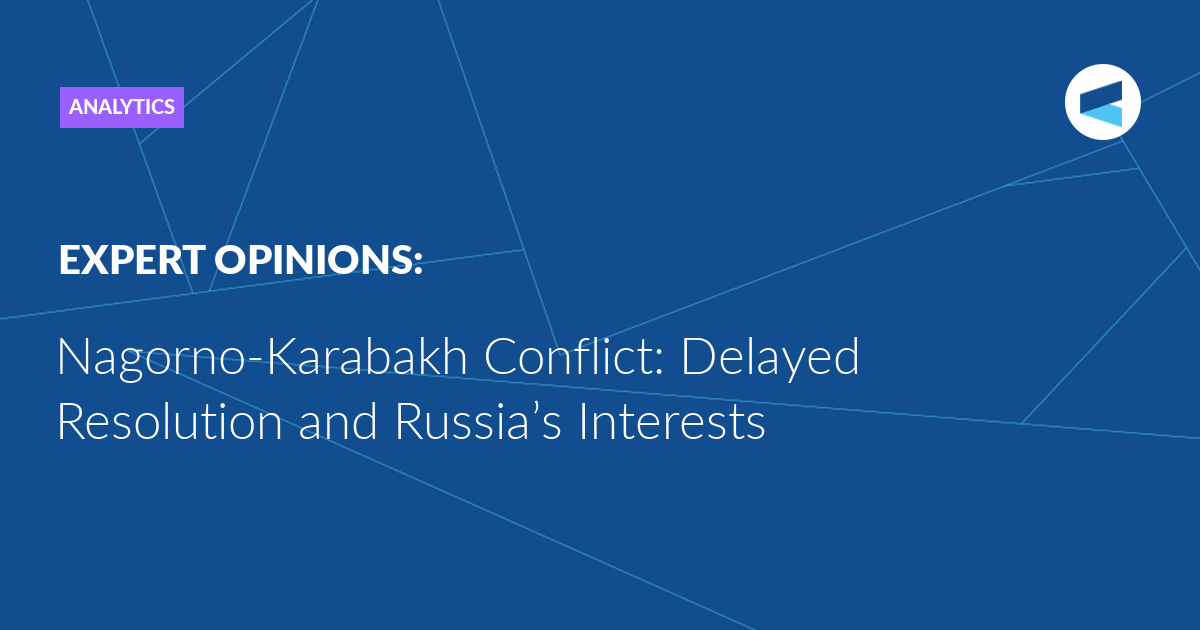
Status quo again?
What else has not been “solved” in the Armenian-Azerbaijani confrontation? First of all, one should pay attention to the fact that the document signed on November 9, 2020, by the leaders of Azerbaijan, Armenia and Russia, is not a political agreement, as journalists often call it. This is a joint statement by the leaders of the three countries, aimed at ending the military confrontation. It stipulates only one of the “baskets” of the peace process — the de-occupation of territories outside the former NKAO. But the second “basket” — the status of the disputed region, which, in fact, served as a trigger of the conflict in its time, is not considered. It is not even mentioned. The reason for this silence is obvious. At the stage when the priority task was to suspend hostilities, it was impossible to raise such a question as a precondition for a ceasefire. This would inevitably doom the peace initiative to failure. It would simply repeat the fate of the three previous proposals put forth by Russia, France and the United States.
However, this issue has not disappeared from the settlement agenda, as evidenced by the statement by Armenian Prime Minister Nikol Pashinyan following a trilateral meeting in Moscow on January 11, 2021. On the contrary, Azerbaijan considers this issue to be actually resolved, identifying the status problem with the restoration of territorial integrity. It should also be kept in mind that Pashinyan’s persistence is largely due to the internal political situation in Armenia. Dissatisfaction with Yerevan’s concessions to Baku remains too great. And there is still a solution to the issue of the delimitation and demarcation of the Armenian-Azerbaijani border, which was sharply actualised after the second Karabakh war. The possibility of new, even meagre territorial concessions creates additional risks for Pashinyan. However, this story is not limited to individual politicians.
Finding a solution beyond the truce
This means that it is extremely important to work out some kind of comprehensive agreement that will extend beyond the suspension of hostilities. At first glance, it already exists. These are the “basic principles” that became the basis for the 2009 negotiations. But they were adopted under the old status quo, and a significant part of them were implemented, although not at the negotiating table, but during the course of hostilities. For the first time since the collapse of the Soviet Union, peacekeepers have appeared in Karabakh. Their role is positively assessed, both in Baku and in Yerevan. However, their mandate is limited to five years, which, for example, was not the case in Abkhazia, South Ossetia or Transnistria. Obviously, Yerevan and Baku are pinning diametrically opposite hopes on the Russian mission. Today we see, on the one hand, the integration of the territories around the NKAO into Azerbaijan, and on the other, the preservation of the infrastructure of the unrecognised Nagorno-Karabakh Republic, albeit in a reduced form. Its own administration operates on its territory, personnel reshuffles are carried out, and plans for the future are being drawn up outside the jurisdiction of Baku. By themselves, such collisions will not disappear. The differing views of large external players on how to arrange Karabakh won’t disappear either. While Russia, Iran and Turkey would prefer to interact with each other and that the involvement of “Western partners” remained minimal, the three Eurasian giants have assessed the prospects of the Caucasus and their participation in resolving the problems of this region differently. Thus, along with the remaining Armenian-Azerbaijani contradictions (the final status of Karabakh plus a new border delimitation), the geopolitical factor also has a significant “added value”. Amid these conditions, the search for a solution outside the framework of a military ceasefire will take place.
Russia: Balance of Interests as a Way to Strengthen Leadership in the Caucasus
After Russia managed to stop the military conflict and take the lead in the negotiation process under the new status quo, the collective West, as a player in Karabakh affairs, was quickly discounted by many. However, the more active involvement of the United States and its allies does not seem like a completely closed topic. Today Washington and Paris (the two co-chairs of the OSCE Minsk Group) are watching Moscow’s activity and leadership positions. However, this is far from passive observance. Suffice it to look at the recent initiative of the US Congress regarding Karabakh, addressed to the Director of American National Intelligence.
"conflict" - Google News
January 13, 2021 at 09:03PM
https://ift.tt/2LP0kmY
Nagorno-Karabakh Conflict: Delayed Resolution and Russia's Interests - Valdai Discussion Club
"conflict" - Google News
https://ift.tt/3bZ36xX
https://ift.tt/3aYn0I8
Bagikan Berita Ini














0 Response to "Nagorno-Karabakh Conflict: Delayed Resolution and Russia's Interests - Valdai Discussion Club"
Post a Comment